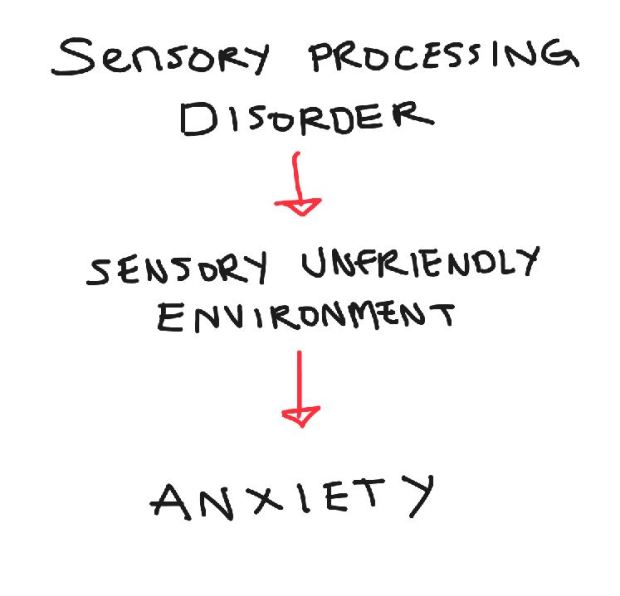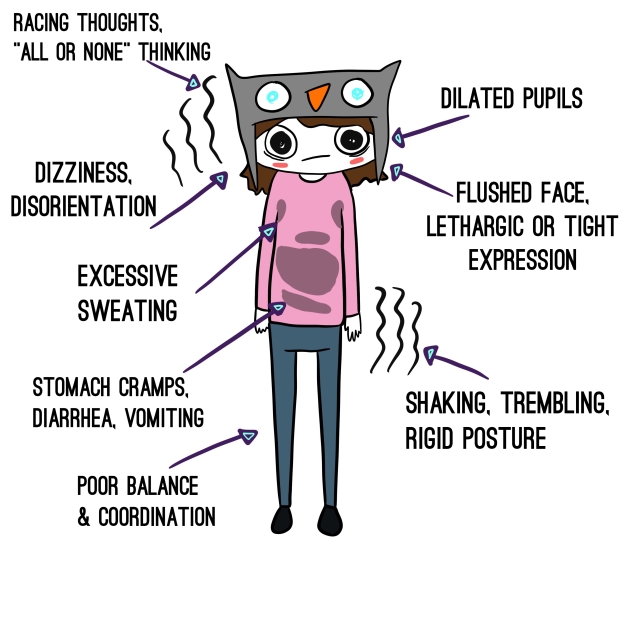Before you dive in, a quick note. This article was written for the STAR Institute for SPD for Sensory Awareness Month 2017. Sensory anxiety is a topic near and dear to my heart. After it was published, I heard from so many people around the world about how this particular article had really moved them. I was so grateful. I am finally publishing it here on my blog, where it will live forever and evah.
—————————————————————————————————————————-
Let’s talk about something that nearly every single person with sensory issues has to deal with: ANXIETY. Gosh! Even the word itself sets me on edge.
For people with Sensory Processing Disorder, anxiety comes as part of the package. It’s the bonus prize that nobody wants.

SPD and Anxiety work together to cause mayhem. They play off each other, and create a spiral effect of symptoms.
Strangely, when we talk about sensory problems, anxiety is rarely part of that conversation. The focus is always on the sensory part of SPD. But I would like to shed some light on the chaos that anxiety can cause when it’s teamed up with SPD, and why it’s different than non-sensory anxiety.
But first, it’s time for a little story. A short tale of my own experience with sensory anxiety to set the stage. The following is the true and slightly uncomfortable reality of my life:
I’ve always been told that the best – and perhaps only – way to conquer anxiety is to put myself into situations that make me anxious, and to push through it.
(Whatever that means.)
I’ve done this for years.
I’ve done this most recently through college, where every morning before my commute to school, I had to give myself extra time because of anxiety-induced diarrhea and nausea. My agonizing stomach cramps and bathroom visit occurred daily, without fail. (I told you this was going to be an uncomfortable story.) I couldn’t stomach food for hours. But, only on the days when I had school. There are no such things as coincidences in this sensory life.
Once I made it to school, I often had to give myself even more time to find a bathroom and change my shirt, which would’ve been soaked in sweat before my first class even began. I spent the large part of my day feeling enormously dizzy. My face hurt from a clenched jaw and the muscles in my back were sore from tension.
Often, I bought myself a warm drink in an attempt to soothe my trembling body, which was trembling on account of being both anxious and also cold. (Fact: when the body is anxious, blood rushes to the main organs, leaving the extremities feeling cold and/or numb.)
I’d come home at the end of the day and nap for an unreasonable amount of time, like 6 hours. My body was depleted, from what I assumed was sensory overload. One day it occurred to me that I was not only physically and emotionally exhausted from SPD, but also from my anxiety that was caused by my SPD. Then the anxiety and SPD and feeling helpless and feeling hopeless made me seriously depressed. Would the fun ever end? I wondered.
I went to college for four and a half years. I pushed through my debilitating anxiety every day, and wouldn’t you know it, the last day of college rolled along, and that morning I had diarrhea and a sweat-soaked shirt. Just like the first day.

The End!
I know, I know. It was a truly riveting tale. One that will certainly go down in history as one of the greatest stories known to man. But let’s get back to what matters here. Physical symptoms of anxiety are only one part of the equation.
At the end of the day, I learned that pushing through my anxiety did nothing to help alleviate it. All it did was make me miserable and feel like I was weak for not being able to get rid of my symptoms.
Since that time, I’ve come to realize that the reason traditional methods of alleviating anxiety were not working for me was because I had a very good reason to be anxious.
Now it’s time to introduce the second part of this equation: Sensory Processing Disorder.
In my case, my SPD has gifted me with overwhelming sensory sensitivity and the inability to function when having to process multiple sensory stimuli. In most environments, like a classroom for example, my body picks up on the sounds, smells, textures, and even the vibe in the air to an outrageous extent. My sensory brain is turned up to the highest setting and it isn’t very good at turning off.


As one can imagine, having SPD is not fun. Anybody who says it is, well, they are a goober. It’s called a disorder for a reason. It’s not called Sensory Processing Fun Times All Around (SPFTAA). Although, I admit that would be a cool thing.
Dear reader who I love so very much even though I’ve never met you,
If you can relate to my gastrointestinal distress in sensory-ugly environments, please take comfort in the fact that what you are feeling both physically and emotionally is very normal. For instance, when the sound of most people’s voices are loud to the point of severe discomfort, being in a place with lots of people talking is going to give you anxiety. It makes sense.
Let’s briefly recap and take a look at the complete equation. Keep in mind, I spent a lot of time making this:


Consider this:
You wouldn’t say to someone, “hey, I know there’s a hungry shark in this swimming pool, and every time you’ve gone in he’s bitten you, BUT you don’t need to be anxious about swimming because if you keep going in, he won’t bite you anymore!”
Yet, we’ve been telling ourselves, “hey self, I know you have SPD, and every time you go into a sensory unfriendly environment it’s super distressing, but you don’t need to be anxious this time because if you keep pushing through it, you won’t have anxiety anymore!”

This concept of pushing through anxiety often works for regular, non-sensory anxiety. Allow me to demonstrate:
When you were five you went to a birthday party. A person waved a bunch of balloons around your face and you FREAKED OUT. Fast forward ten years later, and you have anxiety whenever you see balloons.
To alleviate this kind of anxiety, you start to spend time around balloons. Maybe you go into a room where someone has placed a balloon. Maybe next time, you move a bit closer to it. After that, you touch one. Your balloon-related anxiety slowly improves over time. You are able to push through the anxiety by addressing the irrational thoughts and fears you experience, and replacing them with rational ones. “Balloons aren’t scary. I do not need to feel anxious around them. I am ok.”
**I’d like to note that when I say regular anxiety I do not mean less anxiety. Anxiety from having a neurological condition like SPD is a different kind of anxiety, not more or less severe than anxiety from other things.**
Now let me demonstrate how this concept does not work for sensory anxiety:
When you were six you went to a birthday party. You are sound sensitive, and during the party, kids were popping balloons. It upset you deeply. Fast forward ten years later, and you have anxiety whenever you see balloons.
To alleviate this kind of anxiety, being around balloons will not reduce your anxious feelings because you are still sound sensitive, and balloons could potentially pop at any time. If they pop, it will scare you the same every time.
WHY DOES THIS HAPPEN?
The reason people with sensory problems have recurring, stubborn anxiety is because many SPD’ers lack the ability to habituate (become accustomed to) new information. Our unique sensory systems do not do well with what I refer to as POTENTIAL stimuli. We like routine and predictability. But a lot of sensory stimuli is neither of those things. The world is full of random, unusual and unpredictable things. When you have a brain that struggles to make sense of the predictable – let alone the unpredictable – it’s easy to understand why anxiety is the result.
WHAT DOES SENSORY ANXIETY FEEL LIKE?
When you have anxiety from sensory issues, it presents itself the same way non-sensory anxiety does; the symptoms are virtually the same. It can be hard to distinguish between sensory overload and anxiety. Most commonly, SPD anxiety can look like this:

However, if you notice, the symptoms of sensory anxiety are similar to symptoms of a freeze response. Unless the sensory stimulation or the anxiety reaches a breaking point, people with SPD tend to literally freeze during an anxiety crisis. The meltdown and shutdown occurs after, when they are in a safer space to let it all out. Of course, this doesn’t always happen so nicely, and sometimes you find yourself completely dissociated and about to vomit from a fire drill in the middle of the hallway at school. It’s equal parts inconvenient and embarrassing.
HOW DO I HANDLE SENSORY ANXIETY?
Consider the source! To fix or improve sensory anxiety, you have to learn what sensory-related problems give you anxiety in the first place. You don’t want to keeping jumping into the swimming pool with the shark. Remove that shark before you go swimming!
Here are some of my favorite, tried-and-true methods for relieving anxiety when it’s tied to sensory issues:
- Make it known: Tell people around you that you have sensory issues. Explain specifically what you struggle with (noise, physical contact, need for fidgeting). When more people are aware of it, the more likely your surroundings will be a sensory-safe space, which will reduce your anxiety. People can’t help you remove the shark from the swimming pool if they don’t know it’s there.
- Alternatives and Avoidance: I tell people this all the time, and I’m saying it again. It’s very much ok to avoid the anxiety-producing event all together. Perhaps there is another swimming pool without any sharks. Or perhaps you do not have to swim today. It’s very much acceptable to turn down an offer to swim if you know you’ll be bitten by sharks.
- Gear up: Sometimes, you have to swim with sharks. The best thing to do is to prepare your physical and emotional state for this encounter. Some sensory anxiety can’t be avoided, and when that happens, gear up your sensory self in the ways that work for you. Maybe you need to jump on a trampoline, or use a Wilbarger brush, or use a fidget. Allow yourself time to do what you need to ahead of time.
- Make time to bounce back: In the event that you did have to swim with a shark, and there was no time to prepare beforehand, it’s necessary to dedicate time and energy to letting your sensory anxiety calm down afterward. Just like preparing beforehand, it’s crucial to give yourself time to bounce back after.
With all that in mind, I must conclude with this: experiencing anxiety from having sensory issues is normal, common, and expected. Don’t beat yourself up about it. Your brain is reacting as any brain would under the circumstances. I know somedays the anxiety can be crippling. Other days, it can seem like it’s on a permanent vacation! Flip flopping like that can be draining and confusing.
Pushing through sensory anxiety won’t work to alleviate it, but that doesn’t mean you should stop pushing the boundaries of your life as a person with sensory issues. You don’t have to go in the shark pool, but it’s probably to your advantage to go up the edge and peek in.
You darling girl, I am so sorry the world feels like a shark-infested swimming pool to you. My 14-year-old daughter has SPD, and your article has given me much to discuss with her. She doesn’t experience the GI issues you do, but she’s frequently exhausted even before going somewhere, so I’m going to discuss this with her and see if her exhaustion is actually anxiety. To complicate matters, she also has cerebral palsy and epilepsy, both of which can also make her exhausted.
I would give you a hug, but I’m not sure if hugs are sharks to you. Instead, please accept a virtual hug in whatever form might be most acceptable and least stressful to you.
Hi! Sorry for the late reply! I’ve been swimming with the sharks….ughhh
I’m so glad you enjoyed my article. I’ve found so many parents write to me regarding their children. Hearing about them is like hearing about mini versions of myself, which is why I want to write so much and help. Its like trying to help my past self understand what the heck is going on, you know.
If your daughter is able to, tell her she can write to me any time if she has any questions about anything. It’s hard at that age to find someone who understands. And yes, I would LOVE a hug from you! Hahahaha I love a good squeeze, it’s a feel-good sensory thing. Thank you for your super kindness! Xoxoxoxoxoxox
thank you for writing this. i have severe anxiety & at least one of my children has SPD–and the rest of us are highly sensitive. every day is a struggle. ❤
I’m sorry life is hard and crappy, I feel you – hugs to you through the screen xoxoxox
The first method you suggest is “Making it known”. I have started doing this with mixed results. While it is a wonderful thing to have people care, I find to some degree it can make things more difficult. “Is that light bothering you?”, “Would you be more comfortable sitting over here?”, “Do you need to borrow my sunglasses? Those headlights are really bright.”… Being newly diagnosed with SPD, I am already hyperaware of my hyperawareness. It is like these comments throw a spotlight on things already blaring in my brain with the light of a thousands suns. I have a hard time answering their questions, anxiety abounds, and I feel a bit guilty that I’m asking everyone to accommodate me.
How do you tell people about SPD in a way that they understand but they don’t freak out around you and make it worse? Or is that just the way it is until the newness wears off?
Thank you Kelly, I really appreciate your blog.
Hi Martha, sorry for the delay in responding to your posts. I really appreciate everything you write. I’m depressed and have not been as active on my blog as I would like to be. With that being said, as far as your question goes about “making it known”…yes it is way easier said than done. I’ve struggled for years trying to find method that works. I’ve found that reading people, aka quickly deciding what type of person they are, helps me decide how much I tell them. You can usually tell if someone is willing and open to hearing about and understanding an issue you have, and when they are NOT. If they are not the type to be understanding or willing to accommodate me, I keep it short and sweet and say, “I’m sensitive to loud noises.” That’s the best I can do, and I keep it at that.
If someone makes me sensory issues worse, I just avoid them as much as possible. I don’t need that kind of insanity in my life! If I can’t avoid them, then I make myself as consistent as possible when expressing my needs. If I have to remind someone “can you please stop clapping, it bothers me” I will, over and over. But also, I remove myself from the situation if it’s an option. I also feel guilty about having so many “special needs.” It’s like, “I don’t want to deal with this, but here’s my situation.” It stinks on ice, seriously. I feel you!
Thank you for your reply. Swimming with sharks is tough. I find myself down in the depths as well. Hang in there. I will reread what posty bloggy thingies you’ve done and patiently wait for more.
Love your sense of humor!
Take care!
This is exactly what I needed to hear today! I’m 17, just started sixth form without any of my high school and two years into trying to figure out life with the letters SPD (hyper sensitivity to sound and light, compensated for with need for movement and physical contact). You described it so well – especially the freezing in the moment, and crashing later bit – and I want to share this with everyone, charging around waving it in their faces, yelling “I told you! It isn’t just me!”. Thank you Kelly, have a virtual hug and a fidget toy or something in a form which is equally relaxing and enjoyable to you. 🙂
sorry for the late reply to your lovely comment – many hugs, fidgets and treats right back at ya! xoxo
Brilliant!
No, you are 🙂
My 12 year old son who was Diagnosed with SPD at age 7, and later developed OCD to “deal” with the anxiety associated with SPD.
I never considered my anxiety being different because of SPD. But that makes a lot of sense. And also helps explain why repeatedly trying to face situations doesn’t always make it easier or less stressful. The physical symptoms keep showing up. Thank you!
Very Interesting! I’m unsure where I fall but I feel like the anxiety I experience has to do with taking in information deeply. If I’m in a place that has a lot going on my brain, heart, soul…whatever part is overwhelmed because I can’t process everything…therefore what I feel is anxiety. I don’t like Christmas because there is input from too many people about too many things in too many ways. I can’t process it. Being older and wiser now. I can tell the part that is overwhelmed…”hey, sweety”. You don’t have to process this.” It doesn’t ended the over stimulation but there is a minor sigh of relief. I do what you suggested. I have lots of recovery time. I know Sunday there is a lot going on. I picked what I wanted to attend. Told people how long I would attend. Have empty hours before. Won’t have Monday as a highly scheduled day. I just say that I’m peopled out! People can feel anyway they want to feel about it. Thanks for sharing your experience!
Reblogged this on School Refusal Families and commented:
This is such an interesting and well constructed description, I had to share it – thank you
The main problem I keep facing with “making it known” is the fact that most people refuse to believe in anything that contradicts their personal experiences. Anyone who has different experiences CLEARLY must just be lying.
Even the people who know about the existence of sensory processing disorders (and know that, no, autism isn’t something you can snap out of magically at the age of eighteen, or pray away) don’t really have any concept of what it actually feels like. The ones who don’t actually think I’m lying assume that loud sounds ANNOY me, when the truth is that they cause me INTENSE, PHYSICAL PAIN.
A young minister (whose wife is a licensed therapist) commiserated with me about the effect his two-year-old twins’ screaming had on me. “I know,” he said. “It’s like nails on a chalkboard.”
I replied earnestly, “Well, no, it’s actually more like a barbed ice-pick being shoved into my ear. And sometimes the pick is heated up to about a thousand degrees first.”
He found that description horrifyingly graphic. Some of the older people (once again) thought I was either massively exaggerating or making it up entirely. I was just glad I had finally found a way to articulate exactly the way these intolerably loud sounds feel to me.
(P.S. So with you on the accompanying anxiety! Excellent article.)
Hi Lydia, thank you for your comment. You’ll find that so many people are in the same boat as you’ve described. The general nuerotypical population has less-than-stellar empathy, and they tend to not be willing to even consider the fact that people experience the world differently than themselves. I must admit, I like your approach of the blunt description of what sound feels like to you. Sometimes you have to shock people into listening to you.
It makes me anxious just to THINK about anxiety.
Brilliant post because it also serves to elucidate for those who don’t experience this fun phenomenon as well as offer some tools.
And ART!
Thanks and love,
Full Spectrum Mama
Thankyou so much! This is exactly what we live everyday but it’s never been explained this way. I’ve never heard the habituation inability explained before but of course it makes perfect sense. I don’t want to stop trying to get my eight year old daughter through all her fears and anxieties but as you’ve explained…that fire alarm or scary dog gets her on the same level of fear every single time. We do “brave” courses and participate in different counselling ideas but it never sat well that everyone and everything is pointing to her flaws and so-called lack of “resilience”. That freeze response is exactly her! No one sees anthing at school but by hell I see it come out the second she’s safe at home. She’s profoundly deaf as part of a Syndrome with a string of symptoms. She’s constantly swimming with sharks and she was born this way. Sometimes it is really nice to just tell her she doesn’t have to swim. Thanks so much for this. When someone (even if it’s only one person) is on the same page, it’s such a sense of relief and support x
Hi Angela! Thanks for your comment. I’m happy to hear that my words were of comfort for you. Hugs to you and your daughter xo
I found this article on Star Institute. I can not thank you enough for writing it. It has helped me understand my daughters SPD related anxiety immensely! So glad I found your site!!!!!
Thank you!!! I’m so happy to have helped you and your lovely daughter!
Hi Kelly,
I’m so glad, I found you. Thank you for writing about SPD.
If you ever need a friend in Australia, I’m always here for you.
Olena
Hey Olena! I don’t know why I’m only seeing your comment now, my apologies. Thank you so very much for your kind words. I’m all the way in New York, but I would love to have an Australian friend via the internet 😛 Peace xoxo
Wow! What a beautifully written, insightful piece. Thank you for helping me understand my son a bit more. He’s only 10 but I can’t remember a time when we weren’t battling his sensory demons and anxiety. I’m now going to read all your articles. Thank you for sharing your experience x
Thanks for your comment Wendy – if you ever have any questions, please feel free to contact me anytime. I’m a vessel of experience, and I’m happy to help you and your son navigate the sensory realm. Peace!